Stevens calls for change on first day
- 1 April 2014

NHS England’s new chief executive, Simon Stevens, has taken up the top job in health service management.
The commissioning board issued a press statement saying that Stevens would spend the day in the North East, visiting health services at the forefront of the current reform agenda.
These include a GP-led medical centre that offers patients online booking and repeat prescribing, as well as one of the 14 ‘integration pioneers’ looking for ways to join up health and social care.
In a move that looks as if it is designed to bolster his NHS credentials, Stevens, a former NHS manager who has worked in the US for United Health for the past decade, will also give a speech focusing on the continued relevance of the health service and the dedication of its staff.
However, he will also warn that the NHS “needs to change”, to “navigate this turbulent economic period” and because some of the traditional ways of organisation services “do not make much sense.”
Stevens’ predecessor, Sir David Nicholson, warned as early as 2008 that the NHS was facing a gap between flat funding and growing demand that could reach £20 billion by 2015.
He urged the NHS to make up the difference by finding quality, innovation, productivity and prevention savings, and the health service is on course to do this overall, mainly by freezing management costs and holding down wages.
Sir David warned last summer that major changes would be needed to maintain progress, and NHS England is now working on new service models for acute, primary and community care, backed by a ‘big conversation’ to try and convince the public.
Stevens will say today: “We face new challenges and need new solutions, while holding onto the vital gains of the past.
“At all times, our guiding principle will be: Walk in the shoes of the people we serve. Think like a patient, act like a taxpayer.”
Despite the continuities with his predecessor’s messages, Steven’s arrival is likely to mark a significant change of approach for NHS England.
He has already said that he intends to work out of London, rather than Leeds, where Sir David set up the new organisaion after the reorganisation of the health service triggered by health secretary Andrew Lansley, hoping to keep NHS England at one remove from politics.
Stevens has also announced his first senior appointment. As EHI reported yesterday, NHS England’s chief technology officer, Alex Abbot, is leaving at the end of April, and Karen Wheeler from the Department of Health has been appointed to head up a new ‘transformation and corporate operations’ directorate with responsibility for IT.
Wheeler will report direct to Stevens, who has some experience of IT, since he was a policy advisor to the health secretary and then the Prime Minister when the National Programme for IT was set up. United Health has also been caught up in the technological problems that have marred the start of the ‘Obamacare’ programme.
Sir David had even more experience of NHS IT; as senior responsible officer for the programme, he was often called to Parliament to defend it.
However, he was also responsible for encouraging the NHS to focus on the ‘clinical 5’ as it struggled, and for some of the more recent moves to hand back responsibility for IT purchasing to trusts, with central guidance and funding.




